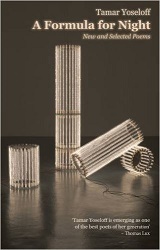Review of A Formula for Night by Tamar Yoseloff, Seren 2015

With a Selected, it's fun to go back to early poems and see when various themes and techniques emerged. I hadn't read the poems from Sweetheart for some time, and had forgotten how reminiscence-based they were: like many first collections, they take much inspiration from parents, childhood memories, early love affairs. But already individual traits are emerging. The memories don't all come from one place: America, London, Scotland all figure. There's a keen interest in the mortality of things, the insides of animals and people, the way places change over time. In "Fleet" we see both this and another preoccupation that will become central: this is essentially an urban poet who is more moved and vitalised by cityscapes than rural scenes:
             I glide blissfully through my day,
all liquid, like a fish. I can't understand
what gives this extra lift to my step, as if I'm floating,
and the cars drifting through Clerkenwell Green
are barges carrying sailors home from sea.
But an undercurrent sinks me at Islington:
I sense the bones of the old prison, the plague-dead
dumped straight from their beds
There's also a hint, in "The Arnolfini Marriage", of the fascination with ekphrastic poetry and coming at a theme through different media, which would develop into sequences like "The City With Horns", centring on Jackson Pollock, and into her publishing venture Hercules Editions, which has brought out pamphlets by various poets in which words and images work together.
In later collections it becomes ever more evident that this is a displaced poet, one raised in one place (though even then a traveller), but now living elsewhere (and still travelling). I have a fondness for displaced poets, because their way of seeing places seems to me to be unlike any other. Their eye takes nothing for granted; nothing is overlooked for long acquaintance or accepted as commonplace. The delight and surprise pulsing through "The Nolans in Japan", where Tokyo is "a wind-up toy - flashing,/bright" is that of someone seeing it new, but in London too, where she has lived a long time, she is conscious not just of
the alleys wet with condensation
darkened streets
but also of
               the rivers running
just below the ground, the Wandle, the Walbrook
the Tyburn, the Fleet. (Christmas in London)
The other thing about these poets' way of seeing, especially seeing the past, is that a place is not just a place, but that place at a particular moment of time. In "The Atlantic at Asbury Park" a derelict fairground's heyday is briefly evoked and becomes emblematic for that time when everything still seems possible to adolescents, though the evidence of the adults around them suggests otherwise; in "London Particular", the speaker's London merges with the city her father knew decades before.
This consciousness of time passing is always liable to foster a sense of darkness. In many of the London poems, her fascination with ruined buildings comes through; "Construction" is in fact more concerned with what has been demolished:
               The empty plot forgets
clothes strewn on vanished floors, spoons and frying pans;
in demolition the goal is ground,
we are out in the open.
The later poems in particular are getting quite death-haunted, as tends to happen when poets get older. This city-dweller is not usually much for flower poems; it seems grimly appropriate that when she does choose to write about one, it is either poisonous ("Sinister Little Flower") or the invasive, destructive "Knotweed":
               You will not budge
now you've found your calling: the felling
of our failing structures.
In the fine sequence "Fetch", where a woman indulges her fantasies of a different and more dangerous life, Yoseloff's taste for the sinister creates real, gripping tension and fear in the reader. This undercurrent of menace and decay exists in many of her poems, but so, alongside it, does the related carpe diem impulse of "City Winter", another hymn of displacement. Another thing I like about displaced poets is that they have no comfort zone; they are never entirely where they want to be and if there are any answers, they are always somewhere else:
               What you want
you won't find here. A train
leaves the city, its complicated tracks
weave past buildings still to be built,
girders lifting beyond the horizon,
its passengers bound for those lit rooms
flickering like grubby stars
on the outskirts.
This may make for restlessness in the poet, but it stimulates nothing so much as excitement and variety for the reader.
Published on November 27, 2015 03:23
No comments have been added yet.



